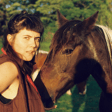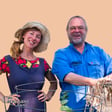
Deer Medicine with Suzy Muir
Can rocks be your besties? Are the shadows safer? How does Deer Medicine help women avoid becoming prey?
Get into this conversation with adventurer, wilderness guide and creature of place Suzy Muir – who, alongside her intrepid husband Jon Muir – live a radically simple off grid existence in the Grampians.
I was lucky enough to meet Suzy in her natural habitat, purely by chance, and have considered her a friend and mentor ever since. Her stories and wisdom and wildness may just have the same effect on you; something to hear with your bones as well as your ears, singing to ancient and latent parts of the soul. Enjoy this whole conversation.
Suzy + Jon’s home on the web ~ Grampians Nature Programs
Suzy + Jon’s accommodation ~ A Boat in the Grampians
Watch Alone Across Australia
Watch Suzy & The Simple Man
Mary Oliver’s poem ~ Wild Geese



















